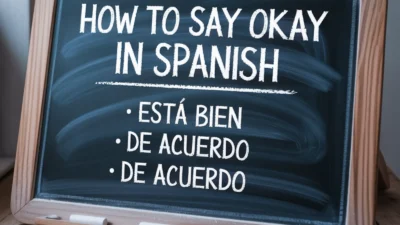How to Say Thank You in Greek is essential to know if you want to express genuine appreciation when visiting Greece or speaking with Greek friends. Learning this simple phrase helps you connect more deeply with Greek culture and show respect for local customs.
Whether you’re thanking someone for a delicious meal, kind hospitality, or helpful directions, knowing the right words makes your gratitude feel warm and sincere.
In this guide, you’ll discover the most common ways to say thank you in Greek, plus tips on pronunciation and polite responses.
1. Ευχαριστώ (Efharistó) — Thank You
Origin:
Derived from the ancient Greek verb εὐχαριστέω, meaning “to give thanks.” It’s the standard and most common way to say thank you.
Example:
👤 User A: Σου έφερα καφέ. (I brought you coffee.)
👤 User B: Ευχαριστώ πολύ! (Thank you very much!)
Use: Neutral and appropriate in almost every situation.
2. Ευχαριστώ πολύ (Efharistó polí) — Thank you very much

Origin:
Adds emphasis with πολύ meaning “very.” A step up in formality and gratitude.
Example:
👤 User A: Σε βοήθησα με τη δουλειά. (I helped you with the work.)
👤 User B: Ευχαριστώ πολύ, το εκτιμώ! (Thanks a lot, I appreciate it!)
Use: Polite, warm, often used in customer service or formal settings.
3. Σ’ ευχαριστώ (S’ efharistó) — I thank you
Origin:
A shortened version of “Σε ευχαριστώ,” literally “I thank you.” More personal and commonly spoken.
Example:
👤 User A: Πέρασα υπέροχα σήμερα. (I had a great time today.)
👤 User B: Σ’ ευχαριστώ, κι εγώ το ίδιο! (Thank you, me too!)
Use: Casual to semi-formal.
4. Ευχαριστούμε (Efharistoúme) — Thank you (plural)
Origin:
Used when a group of people is thanking someone, with -με denoting “we.”
Example:
👤 User A: Ετοίμασα φαγητό για όλους. (I cooked for everyone.)
👤 User B: Ευχαριστούμε πολύ! (Thank you all so much!)
Use: Group settings, families, teams, or formal thank-you speeches.
5. Χίλια ευχαριστώ (Chília efharistó) — A thousand thanks
Origin:
A poetic and expressive phrase that literally means “a thousand thanks.”
Example:
👤 User A: Βρήκα το πορτοφόλι σου! (I found your wallet!)
👤 User B: Χίλια ευχαριστώ! Με έσωσες! (A thousand thanks! You saved me!)
Use: Warm and emotional gratitude.
6. Σε ευγνωμονώ (Se evgnomonó) — I am grateful to you

Origin:
From the word ευγνωμοσύνη (evgnomosýni – gratitude). This is more formal and deep.
Example:
👤 User A: Σου χρωστάω χάρη. (I owe you a favor.)
👤 User B: Σε ευγνωμονώ για όλα. (I’m truly grateful to you for everything.)
Use: Very formal or heartfelt; often written.
7. Να ’σαι καλά (Na ’se kalá) — Be well
Origin:
Literally a blessing: “May you be well.” Used instead of “thank you” in casual chats.
Example:
👤 User A: Σου άφησα λίγο φαγητό. (I left you some food.)
👤 User B: Να ’σαι καλά! (Thanks! You’re the best!)
Use: Casual, warm, common among friends and family.
8. Χάρηκα πολύ (Chárika polí) — I’m very pleased
Origin:
Means “I’m happy” but often used as a polite reply or part of a “thank you” expression.
Example:
👤 User A: Χάρηκα που σε γνώρισα. (Nice to meet you.)
👤 User B: Κι εγώ! Χάρηκα πολύ. (Me too! Thank you, it was a pleasure.)
Use: Social and polite introductions.
9. Να είσαι καλά (Na eísai kalá) — May you be well
Origin:
Another variation of “be well.” Very Greek in spirit—blessing mixed with thanks.
Example:
👤 User A: Σου έφερα λίγο ψωμί. (I brought you some bread.)
👤 User B: Να είσαι καλά, ευχαριστώ! (Bless you, thank you!)
Use: Common in rural areas and with elders.
10. Μπράβο σου (Brávo sou) — Good for you / Well done
Origin:
Borrowed from Italian bravo. While not a “thank you,” it often expresses appreciation in context.
Example:
👤 User A: Καθάρισα όλο το σπίτι. (I cleaned the whole house.)
👤 User B: Μπράβο σου! (Wow, thank you, great job!)
Use: Appreciation or praise, especially with younger people.
11. Σας ευχαριστώ (Sas efharistó) — I thank you (formal)
Origin:
Using σας makes the thank-you more formal or plural.
Example:
👤 User A: Ορίστε τα έγγραφα. (Here are the documents.)
👤 User B: Σας ευχαριστώ, κύριε. (Thank you, sir.)
Use: Formal settings, business, elders.
12. Εκτιμώ πολύ (Ektimó polí) — I really appreciate it

Origin:
From the verb εκτιμώ (to appreciate/estimate). A way to express deeper acknowledgment.
Example:
👤 User A: Κράτησα θέση για σένα. (I saved you a seat.)
👤 User B: Εκτιμώ πολύ, ευχαριστώ! (I really appreciate it, thank you!)
Use: Semi-formal and sincere.
13. Με συγκίνησες (Me synkínises) — You touched me
Origin:
Used when a gesture brings emotional gratitude. “You moved me.”
Example:
👤 User A: Έκανα δωρεά στο όνομά σου. (I made a donation in your name.)
👤 User B: Με συγκίνησες… Ευχαριστώ από καρδιάς. (You touched my heart… Thank you from the heart.)
Use: Emotional, deep appreciation.
14. Το εκτιμώ (To ektimó) — I appreciate it
Origin:
Short, modern, and often used in everyday speech.
Example:
👤 User A: Σε κάλυψα στη δουλειά. (I covered for you at work.)
👤 User B: Το εκτιμώ, ειλικρινά. (I really appreciate it.)
Use: Common and modern; can be formal or casual.
15. Ευχαριστώ από καρδιάς (Efharistó apó kardiás) — Thank you from the heart
Origin:
Poetic phrase meaning sincere, heartfelt gratitude.
Example:
👤 User A: Σε στήριξα σε δύσκολες στιγμές. (I supported you during hard times.)
👤 User B: Ευχαριστώ από καρδιάς. (Thank you from the bottom of my heart.)
Use: Heartfelt and touching, often in speeches or emotional moments.
Conclousion:
How to Say Thank You in Greek is a simple phrase that can leave a lasting impression when speaking with native Greek speakers. Whether you’re traveling, meeting new people, or exploring Greek culture, using “Efharistó” shows respect and kindness. Keep practicing, and you’ll find it easier to connect and communicate with confidence.
It’s a small gesture that opens doors to genuine human connection. Don’t be shy—Greeks appreciate any effort to speak their language!
Want to keep learning? Don’t miss our guide on How to Say Hello in Greek for more essential greetings!



